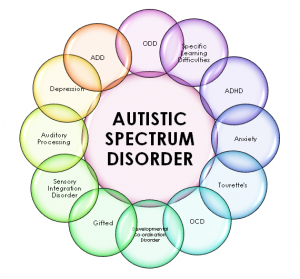WHAT IS AUTISM SPECTRUM DISORDER?
Autism Spectrum Disorder is a broad term used to describe those with a variety of social and physical challenges, including but not limited to an inability to understand social cues, compulsively repetitive behaviors (both verbal and nonverbal), and overall difficulty with communication. There is no one way to identify the disorder since it presents itself differently in each individual, but there are certain things to look for if a parent believes that their child may be affected.

1. Sensory Sensitivity – This is one of the most common challenges an autistic individual may face. Sights, sounds, smells, physical touches–any of these sensations may suddenly and inexplicably become overwhelming to the point of distress. Something as simple as a ticking clock or a particular color of light may be extremely physically and mentally uncomfortable and result in screaming, crying, and escape attempts from the affected individual. It’s important to pay close attention to what causes these episodes, as they could be regular triggers.
2. Gastrointestinal (GI) Disorders – GI disorders are not uncommon for people on the spectrum. Diarrhea, constipation, and frequent heartburn often accompany other signs, and it’s important to discuss treatments for these with a doctor as necessary for the sake of the affected individual’s comfort and lifestyle.
3. Seizures and Sleep Disorders – Epilepsy affects 1 in 4 autistic children and is characterized by a brief loss of consciousness, abnormal staring or movements, and bodily convulsions. Seizures often go hand in hand with sleep disorders, as lack of sleep can be a trigger for epileptic episodes. They may also be induced by high fevers.
4. Mental Health Challenges – The above challenges can all contribute to and be a result of anxiety, depression, and difficulties with attention. It can become a vicious cycle, a bout of painful heartburn causing a tantrum, the tantrum stressing the body into worse pain, etc. Counseling from professionals trained specifically in the disorder can be life-changing for both the autistic child and the child’s parents.
WHAT SHOULD PARENTS LOOK FOR?
Every child presents uniquely, but some behaviors can be key indicators that the child is on the spectrum. An inability or refusal to make eye contact, lack of interest in surroundings even if someone is speaking to them interacting with them, and repetitive behaviors that continue far longer than seems socially appropriate are all fairly recognizable traits that may suggest a child is autistic.
WHAT ARE THE DIFFERENT SPECTRUM’S?
Ultimately, there aren’t true defined “spectrum’s” anymore. Even Asperger’s Syndrome–which is characterized by normal logic-based intelligence but impaired emotional intelligence, a tendency to be very literal in their language (idioms often go misunderstood), and obsessive desires to have things in a certain order–is still simply considered as being on the Autism spectrum.  What differentiates one autistic person from another comes down to heir ability to function independently. How well do they communicate? Can they perform necessary daily tasks like feeding, bathing, and clothing themselves? How well do they handle the emotions of others? Some may be very high-functioning to the point that strangers won’t even realize they’re on the spectrum. Others cannot communicate, verbally or non-verbally, at all.
What differentiates one autistic person from another comes down to heir ability to function independently. How well do they communicate? Can they perform necessary daily tasks like feeding, bathing, and clothing themselves? How well do they handle the emotions of others? Some may be very high-functioning to the point that strangers won’t even realize they’re on the spectrum. Others cannot communicate, verbally or non-verbally, at all.
ARE VACCINATIONS LINKED TO AUTISM?
While there is not an actual link between vaccinations and Autism specifically, Dr. Dianah Lake recommends only giving a child two vaccines at a time. Combining a large number of vaccinations at a time runs a higher risk of causing adverse effects, even if that simply amounts to a fever. That being said, a child is not safe from diseases like measles, mumps, chickenpox, etc. just because most of their peers have been vaccinated. There have been several outbreaks of dangerous diseases because of the decision not to be vaccinated, and children that contract those diseases are defenseless against them.

IS AUTISM HEREDITARY?
There is currently no clear indicator suggesting that Autism is genetic. Studies have shown certain commonalities in changes to genes between autistic individuals, but nothing that conclusively proves that those changes appear only in people with Autism Spectrum Disorder.
MEETING MILESTONES
Every 2-year-old is supposed to have a checkup with their pediatrician that involves going through a checklist of milestones they should be reaching at that age. Walking, talking, using utensils, and other important developmental milestones help to indicate if a child is impaired or struggling in ways that need to be addressed.
CAN THOSE ON THE SPECTRUM LIVE “NORMAL” LIVES?
It all depends on how high- or low-functioning they are and how well they’re able to adapt to the world around them. However, it also depends on how consistently their loved ones work on teaching or improving behaviors and skills. A nonverbal child may not remain nonverbal permanently, especially if their parents are actively working to improve their skills. Persistence is crucial when it comes to teaching an autistic child how to communicate and complete tasks, and positive reinforcement like praise goes a long way toward preparing an autistic child to be independent.
RESOURCES FOR PARENTS
Autism Speaks – Autism Speaks is a national organization, and easily one of the most recognizable groups dedicated to educating the public about Autism Spectrum Disorder. Their website provides information about the disorder (what it is, how to recognize it, strengths and weaknesses associated with autistic people, etc.) along with an extensive resource library. The site’s resource guide allows you to select which state, territory, or Canadian Province you live in, the stage of life your child or loved one is in, and the level of care they require from “Some” to “Intensive.” It then gives you any agencies and resources it finds in categories like advocacies, Autism-friendly services, providers, recreational activities, schools, and support groups within your area.
American Autism Society – The American Autism Society is a huge information bank along with being a reliable resource for parents and loved ones. Along with the same kinds of services and information Autism Speaks provides, AAS also has a plethora of information on current legislation, education and employment laws, and other ways in which people on the spectrum and their loved ones can arm themselves with knowledge and ensure they have as many opportunities as possible.
504 Plan – This program provides specific accommodations for a child with special needs, and can be extremely helpful when ensuring positive and productive experiences within a classroom.
IEP Plan – The Individualized Education Program helps parents formulate a plan tailor-made for their child. There will be meetings in which families can revisit and edit that plan based on the child’s progress or additional needs along the way, and can include specific ways a teacher should interact with the child along with other needs.
Understood.org – This website provides a wonderful support network for parents raising a child with Autism Spectrum Disorder. It shares information about schools that have programs for or otherwise cater to children with special needs, groups in the community who can offer support, and other helpful resources. Pathfinders For Autism (Baltimore) – This group is specifically within Baltimore, MD, and serves as a support network for families raising a child on the spectrum.
Helpful Tips
1. Seek Education – If you’re reading this, you’re already on the right track. The best way you can help your children, your friends, your acquaintances, or even yourself is to learn everything you can about Autism. Be careful with your sources, though, and make sure that what you absorb is based on scientific evidence and findings rather than personal or political opinion. The above resources are reliable and have helped countless families improve their loved one’s quality of life.
2. Pay Attention – Once you’ve educated yourself and can identify the signs, pay attention to the way someone acts. If they do or say something that seems “off,” think about the reasons why. Did they ignore me because they don’t care, or because they can’t interact the way people not on the spectrum do? Did this person say something hurtful and move on like it was nothing because they meant to be rude, or because they don’t understand social cues or have the same kind of emotional intelligence as others? Asking these questions can help you recognize when someone may be on the spectrum, and once you know, you might find that you have more patience or understanding for odd behaviors.
3. Be Patient – As said above, knowing why someone acts differently can be a big factor in knowing how to react in kind. It can be easy to get frustrated when talking to someone who doesn’t get their attention and questions go ignored. Repetitive behaviors like making a sound or kicking something nonstop can be infuriating for everyone around. People on the spectrum need to be shown patience and understanding, especially if they’re genuinely trying to communicate something important.
4. Be Consistent and Supportive – If you have a child on the spectrum or regularly interact with someone on the spectrum, consistently try to encourage healthy behaviors. Work with them every day and let that repetition and praise for successes motivate them to keep trying until they improve. Though children on the spectrum may struggle with communication and social cues, they understand how it feels when they succeed, and you have the power to help them experience that time and time again
Key Takeaways from This Episode
-
Learn more about Dr. Dianah Lake on her website.
-
-
Education and patience is a must when dealing with children that have autism.
-
The sooner you catch a child on the spectrum the better equipped you and your child will be.
 What differentiates one autistic person from another comes down to heir ability to function independently. How well do they communicate? Can they perform necessary daily tasks like feeding, bathing, and clothing themselves? How well do they handle the emotions of others? Some may be very high-functioning to the point that strangers won’t even realize they’re on the spectrum. Others cannot communicate, verbally or non-verbally, at all.
What differentiates one autistic person from another comes down to heir ability to function independently. How well do they communicate? Can they perform necessary daily tasks like feeding, bathing, and clothing themselves? How well do they handle the emotions of others? Some may be very high-functioning to the point that strangers won’t even realize they’re on the spectrum. Others cannot communicate, verbally or non-verbally, at all.

